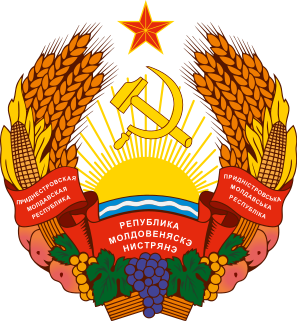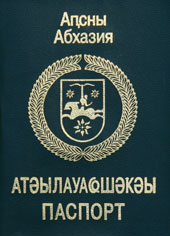
Vladislav Ardzinba was the first de facto President of Abkhazia. A historian by education, Ardzinba led Abkhazia to de facto independence in the 1992–1993 War with Georgia, but its de jure independence from Georgia remained internationally unrecognised during Ardzinba's two terms as President from 1994 to 2005.

South Ossetia, officially the Republic of South Ossetia – the State of Alania, or The Tskhinvali Region, is a disputed territory in the South Caucasus, in the northern part of the internationally recognised Georgian territory. It has a population of 53,000 people who live in an area of 3,900 km2, south of the Russian Caucasus, with 30,000 living in Tskhinvali. The separatist polity, Republic of South Ossetia, is recognised as a state by Russia, Venezuela, Nicaragua, Nauru, and Syria. While Georgia lacks control over South Ossetia, the Georgian government and most members of the United Nations consider the territory part of Georgia, whose constitution designates the area as "the former autonomous district of South Ossetia", in reference to the former Soviet autonomous oblast disbanded in 1990.

Amtsakhara is the principal opposition party of Abkhazia.
Viacheslav Mikhail-ipa Tsugba was the third Prime Minister of the Republic of Abkhazia from December 1999 to May 2001. Before his appointment as Prime Minister, Tsugba had headed the Central Election Committee, which had overseen the internationally unrecognised simultaneously held October 1999 presidential election and constitutional referendum.
Politics in Abkhazia is dominated by its conflict with Georgia. Abkhazia became de facto independent from Georgia after the 1992–1993 war, but its de jure independence has only been recognised by a few other countries. Abkhazia is a presidential representative democratic republic with a multi-party system, wherein the President is both head of state and head of government. Executive power is exercised by the government of the Republic of Abkhazia. Legislative power is vested in both the government and the People's Assembly of Abkhazia.
Abkhazia elects on national level a head of state - the president - and a legislature. The president is elected for a five term by the people. The People's Assembly has 35 members, elected for a five-year term in single seat constituencies. Abkhazia is a one party dominant state. Opposition parties are allowed, but are widely considered to have no real chance of gaining power. The last elections seems to show a development towards a multi-party system.

A seven-question referendum was held in Belarus on 24 November 1996. Four questions were put forward by President Alexander Lukashenko on changing the date of the country's independence day, amending the constitution, changing laws on the sale of land and the abolition of the death penalty. The Supreme Council put forward three questions on constitutional amendments by the Communist and Agrarian factions, local elections and the national finances.

A double referendum was held in Transnistria on 17 September 2006. Voters were asked whether they approved of the possibility of renouncing independence and integration with Moldova, or alternatively independence and a possible future integration into the Russian Federation.

This article refers to the history of Abkhazia from its pre-historic settlement by the lower-paleolithic hunter-gathers during the mesolithic and neolithic periods to the post-1992-1993 war situation.
Parliamentary elections were held in Abkhazia on 4 March 2007, with a second round in seventeen constituencies on 18 March.
Presidential elections were held in Abkhazia on 3 October 1999, alongside a constitutional referendum. They were the first direct presidential elections in Abkhazia, and resulted in a victory for incumbent President Vladislav Ardzinba, who ran unopposed.

An independence referendum was held in the Republic of Georgia on 31 March 1991. It was approved by 99.5% of voters.
Parliamentary elections were held in Abkhazia on 23 November 1996, with a second round on 7 December. There was also a simultaneous referendum held amongst Abkhazian refugees.
A referendum on the New Union Treaty was held in Abkhazia on 17 March 1991, as part of the wider Soviet referendum. The treaty was approved by 98.6% of voters.

The Abkhazian passport is issued to citizens of the Republic of Abkhazia for the purpose of international travel and for the purpose of legal identification within Abkhazia. As Abkhazia is only recognised by Russia, Venezuela, Nicaragua and Nauru, for all other destinations Abkhazian citizens must use another passport for international travel.

A referendum on the future of the Soviet Union was held on 17 March 1991. The question put to voters was

On 12 December 2009, Abkhazia held its fourth Presidential election since the post of President of the Autonomous Republic of Abkhazia was created in 1994. The election was won by incumbent president Sergei Bagapsh in the first round with 61% of the votes, thus gaining a second term in office. He was inaugurated on 12 February 2010. Bagapsh competed against four opposition candidates: former Vice President and Prime Minister Raul Khajimba, who came second behind Bagapsh in the 2004 Presidential election, and newcomers Beslan Butba, Zaur Ardzinba and Vitali Bganba. Khajimba had stated that he, Ardzinba and Butba would support each other should one of them reach the second round of the election.
The elections for the 5th convocation of the People's Assembly of Abkhazia were held in two rounds on 10 and 24 March 2012.

A constitutional referendum was held in the unrecognised Nagorno-Karabakh Republic on 20 February 2017. At least 25% of registered voters needed to vote in favour in order to validate the result. The referendum passed with about three quarters of voters voting.













